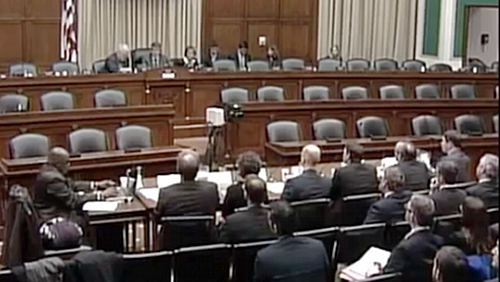The U.S. House of Representatives Subcommittee on Commerce, Manufacturing, and Trade met today for a hearing on the current state of online gaming, including discussion of Rep. Joe Barton’s Internet Poker Freedom Bill. This marked the first congressional hearing on the subject since this summer’s Senate gabfest, and it showed just how much things have changed in such a short time.
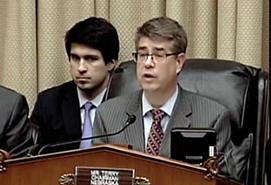 Chairman Lee Terry (R-NE) (pictured right) led off with an introduction to the issue lifted at least partially lifted from AGA talking points, including phrases like “race to the bottom.” Then Leonard Lance (R-NJ) gave an introduction to New Jersey’s new online gambling regime, which he said was expected to produce “hundreds of millions if not billions of dollars annually.”
Chairman Lee Terry (R-NE) (pictured right) led off with an introduction to the issue lifted at least partially lifted from AGA talking points, including phrases like “race to the bottom.” Then Leonard Lance (R-NJ) gave an introduction to New Jersey’s new online gambling regime, which he said was expected to produce “hundreds of millions if not billions of dollars annually.”
Jan Schakowsky (D-IL) then talked about her desire to protect low-income people and minorities, preventing them from using credit to gamble, and maintain consumer privacy. She also desired to address issues of fairness for gamblers, including bots (though she admitted during her statement that she didn’t know what a bot was). Barton (R-TX) then explained bots to Ms. Schakowsky before further explaining his opinion that God is for his bill – a “states’ rights, user-friendly, poker-only bill,” in his words – because he was able to make it to D.C. from Dallas for the hearing despite the weather.
Barton made clear that his bill includes language to address the concerns of privacy and consumer advocates – and that the last hearing on his bill was the most popular live-streamed hearing. Chairman Terry noted that they would hit this mark again because they were the only hearing. (He also asked if a governor could ban Texas Hold’em and only allow his citizens to play Omaha instead.)
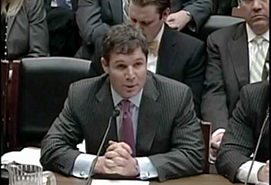 The first witness called was Geoff Freeman (pictured at right), President and CEO of the American Gaming Association. His first conclusion was that online gaming prohibition doesn’t work – $3 billion was spent online last year. Second was that the demand for online gaming will only continue to grow: more than 50,000 players signed up in New Jersey in its first week. Third, and finally, the AGA believes that it can pursue a regulated market while protecting consumers and addressing national security issues, much as dozens of other countries around the world have done – all while respecting states’ rights.
The first witness called was Geoff Freeman (pictured at right), President and CEO of the American Gaming Association. His first conclusion was that online gaming prohibition doesn’t work – $3 billion was spent online last year. Second was that the demand for online gaming will only continue to grow: more than 50,000 players signed up in New Jersey in its first week. Third, and finally, the AGA believes that it can pursue a regulated market while protecting consumers and addressing national security issues, much as dozens of other countries around the world have done – all while respecting states’ rights.
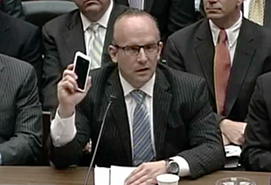 Andrew Abboud (at left), Vice President of Government Relations and Community Development for Las Vegas Sands Corporation, was next up. He said Internet gambling “takes gambling too far,” and demanded that Congress reinstate the old interpretation of the Wire Act. He said the industry wants to turn “every single one of these” – holding up his cell phone – “into a casino.” “Simply because we can doesn’t mean we should,” he said, saying that “the internet is more dangerous than ever.” Then he read a letter from former AGA head Frank Fahrenkopf noting that the Wire Act interpretation is simply an opinion by the current administration, one that can change under the next one.
Andrew Abboud (at left), Vice President of Government Relations and Community Development for Las Vegas Sands Corporation, was next up. He said Internet gambling “takes gambling too far,” and demanded that Congress reinstate the old interpretation of the Wire Act. He said the industry wants to turn “every single one of these” – holding up his cell phone – “into a casino.” “Simply because we can doesn’t mean we should,” he said, saying that “the internet is more dangerous than ever.” Then he read a letter from former AGA head Frank Fahrenkopf noting that the Wire Act interpretation is simply an opinion by the current administration, one that can change under the next one.
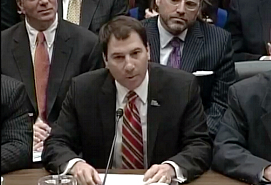 John Pappas (at right) of the Poker Players Alliance was next up. He hit all the familiar talking points in favor of the Barton bill, particularly that states can opt out of the federal bill if they wish, and pointed out that we can learn from a decade of European regulation. He also praised technological solutions to prevent banned groups from playing online, noting out that there has not been a single report of underage access since Nevada went online.
John Pappas (at right) of the Poker Players Alliance was next up. He hit all the familiar talking points in favor of the Barton bill, particularly that states can opt out of the federal bill if they wish, and pointed out that we can learn from a decade of European regulation. He also praised technological solutions to prevent banned groups from playing online, noting out that there has not been a single report of underage access since Nevada went online.
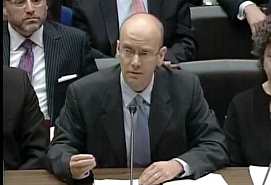 Les Bernal (at left), National Director for Stop Predatory Gambling, was next up. His group is against the government promotion of gambling by creating monopolies and giving regulatory advantages to chosen companies. He said that it has failed to pay for education and public services, as promised when gambling was legalized in various jurisdictions, and that it contributes to economic inequality. He also claimed that 40 to 60 percent of gaming profits come from problem gamblers, while responsible gamblers make up just four percent.
Les Bernal (at left), National Director for Stop Predatory Gambling, was next up. His group is against the government promotion of gambling by creating monopolies and giving regulatory advantages to chosen companies. He said that it has failed to pay for education and public services, as promised when gambling was legalized in various jurisdictions, and that it contributes to economic inequality. He also claimed that 40 to 60 percent of gaming profits come from problem gamblers, while responsible gamblers make up just four percent.
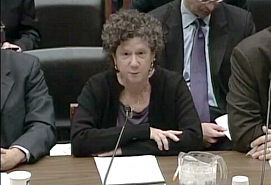 Dr. Rachel Volberg, Associate Professor at the School of Public Health and Health Services at the University of Massachusetts Amherst, was next up. She was concerned that while the bill provides for treatment of problem gamblers, it doesn’t provide any funding for research into problem gamblers and the Internet. She held up the statute passed in her home state of Massachusetts two years ago, which created a trust fund for problem gambling research and treatment.
Dr. Rachel Volberg, Associate Professor at the School of Public Health and Health Services at the University of Massachusetts Amherst, was next up. She was concerned that while the bill provides for treatment of problem gamblers, it doesn’t provide any funding for research into problem gamblers and the Internet. She held up the statute passed in her home state of Massachusetts two years ago, which created a trust fund for problem gambling research and treatment.
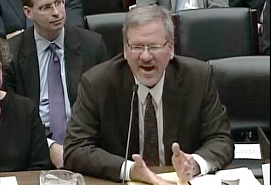 Kurt Eggert (at left), law professor at the Dale E. Fowler School of Law at Chapman University, was next. He wants gamblers to be given all the information they need to make good consumer choices, particularly hold percentages on slot machines. His second concern was that poker players be protected from playing against bots without their knowledge, and that bots “are getting more dangerous all the time.” He suggested a rating system for players. He also wants players to have the chance to self-exclude and place limits on their accounts to avoid gambling more than they want.
Kurt Eggert (at left), law professor at the Dale E. Fowler School of Law at Chapman University, was next. He wants gamblers to be given all the information they need to make good consumer choices, particularly hold percentages on slot machines. His second concern was that poker players be protected from playing against bots without their knowledge, and that bots “are getting more dangerous all the time.” He suggested a rating system for players. He also wants players to have the chance to self-exclude and place limits on their accounts to avoid gambling more than they want.
QUESTIONS… ANSWERS
After these opening statements came the Q&A session. Chairman Terry asked Professor Eggert whether the DOJ interpretation has the force of law. Eggert said that the DOJ’s interpretation was valid. Terry then asked what would happen if states move forward under the new interpretation and the next administration reversed its opinion. Eggert said the government and states would have to go to court at that point to let the judiciary decide.
Chairman Terry then asked Abboud and Pappas how we can know if a minor is playing online if they’re using their parents’ credit cards. Abboud simply said, “Don’t legalize it. Shut down illegal operators.” He said that faced with barriers to market, banned groups will simply go to international operators instead of American ones if those are not shut down. He then ranted about the state of Nevada’s use of poker as a route to get full online gambling before Chairman Terry shut him down. Pappas said that technology for age verification is used across all Internet technologies, not just gaming. He pointed out that there have been no reports of underage access in Europe since 2007 or in Nevada since it went online.
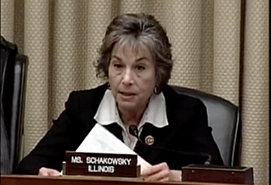 Ms. Schakowsky (at right) started by pointing out that the Venetian promotes mobile wagering within its casino, quoting its marketing materials. “It feels to me a little hypocritical,” she said to Abboud. She asked Eggert whether it is possible to build consumer protections into the legislation to protect people from abuse online. Eggert said he thought it was possible, though no system would ever be perfect, but that poker bots will be a major problem. Ms. Schakowsky then asked Bernal whether states have collected the revenues that were promised when gaming was legalized. Bernal said that not one single state has achieved such numbers. She then asked Dr. Volberg whether the contention that gaming companies make most of their revenues from problem gamblers was accurate. Dr. Volberg said that the industry’s main route has been to increase the number of recreational gamblers.
Ms. Schakowsky (at right) started by pointing out that the Venetian promotes mobile wagering within its casino, quoting its marketing materials. “It feels to me a little hypocritical,” she said to Abboud. She asked Eggert whether it is possible to build consumer protections into the legislation to protect people from abuse online. Eggert said he thought it was possible, though no system would ever be perfect, but that poker bots will be a major problem. Ms. Schakowsky then asked Bernal whether states have collected the revenues that were promised when gaming was legalized. Bernal said that not one single state has achieved such numbers. She then asked Dr. Volberg whether the contention that gaming companies make most of their revenues from problem gamblers was accurate. Dr. Volberg said that the industry’s main route has been to increase the number of recreational gamblers.
 Marsha Blackburn (R-TN) (pictured left) was next up and started off by playfully chastising Barton’s assertion that God is in favor of his bill, saying that the last three digits of its number – H.R. 2666 – were proof that the other side was more likely at work. She noted that her constituents have educated her and the other members greatly on online privacy issues. She asked Freeman and Pappas what the expectations consumers would have for privacy if they chose to gamble online. Freeman said the AGA passionately believes in protecting privacy through regulation, which he said can’t be done on the black market. Pappas said the issues for privacy protection are no different for gaming than it is for any other e-commerce, and we have embraced the latter wholeheartedly.
Marsha Blackburn (R-TN) (pictured left) was next up and started off by playfully chastising Barton’s assertion that God is in favor of his bill, saying that the last three digits of its number – H.R. 2666 – were proof that the other side was more likely at work. She noted that her constituents have educated her and the other members greatly on online privacy issues. She asked Freeman and Pappas what the expectations consumers would have for privacy if they chose to gamble online. Freeman said the AGA passionately believes in protecting privacy through regulation, which he said can’t be done on the black market. Pappas said the issues for privacy protection are no different for gaming than it is for any other e-commerce, and we have embraced the latter wholeheartedly.
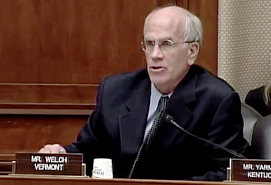 Peter Welch (D-VT) (pictured right) was up next. He pointed out that people will gamble whether it’s legal or not and asked Volberg and Eggert how to make sure that harm minimization was built into the bill sensibly from the start. Eggert said that the main concern was to plan such protections from day one, particularly by including funding for research. He was also concerned about a “race to the bottom” and wanted federal protections against such. Volberg echoed Eggert’s assertions.
Peter Welch (D-VT) (pictured right) was up next. He pointed out that people will gamble whether it’s legal or not and asked Volberg and Eggert how to make sure that harm minimization was built into the bill sensibly from the start. Eggert said that the main concern was to plan such protections from day one, particularly by including funding for research. He was also concerned about a “race to the bottom” and wanted federal protections against such. Volberg echoed Eggert’s assertions.
Welch then asked Freeman and Pappas about how to protect consumers. Freeman pointed out that industries never approach the government asking for regulation, and that working in multiple states has produced a “race to the top” because any state can punish a company for violations of laws in other markets. Pappas said regulators can require companies to adopt “best of breed” technologies to enforce consumer protections. Welch asked Abboud whether there were really no protections that could be instituted. Abboud then said that the Internet didn’t become safe just because the Wire Act interpretation was overturned.
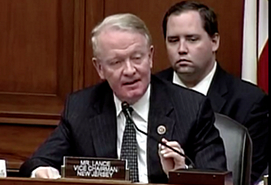 Mr. Lance (at left) was next. He first asked Pappas whether the Barton bill would pre-empt New Jersey’s online regime. Pappas said no state would be restricted from providing non-poker games, but that states offering poker would be required to register with the federal government. Lance asked Freeman and Abboud whether there needs to be legislation addressing the Wire Act. Both agreed, though they wanted different results from such legislation: Abboud wants a restoration of the old hardline interpretation, while Freeman wants a new Wire Act that addresses modern technology.
Mr. Lance (at left) was next. He first asked Pappas whether the Barton bill would pre-empt New Jersey’s online regime. Pappas said no state would be restricted from providing non-poker games, but that states offering poker would be required to register with the federal government. Lance asked Freeman and Abboud whether there needs to be legislation addressing the Wire Act. Both agreed, though they wanted different results from such legislation: Abboud wants a restoration of the old hardline interpretation, while Freeman wants a new Wire Act that addresses modern technology.
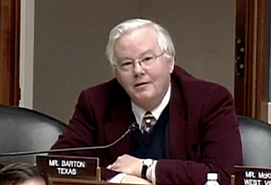 Mr. Barton (at right) was next. He pointed out that tribal concerns were invited to testify before the committee but declined. Then he asked Freeman whether the Barton bill addressed all the AGA’s concerns. Freeman said it hit all the AGA’s major desires. Barton then put the Venetian’s mobile gaming promotional materials on display and asked Abboud what the difference was between what the Venetian offers and allowing such gaming off-property. Abboud said that it was all about human interaction. Barton pointed out that the only difference in his bill and what the Venetian offered is the geography. He also pointed out that poker, which Venetian doesn’t offer on a mobile basis, is a skill game.
Mr. Barton (at right) was next. He pointed out that tribal concerns were invited to testify before the committee but declined. Then he asked Freeman whether the Barton bill addressed all the AGA’s concerns. Freeman said it hit all the AGA’s major desires. Barton then put the Venetian’s mobile gaming promotional materials on display and asked Abboud what the difference was between what the Venetian offers and allowing such gaming off-property. Abboud said that it was all about human interaction. Barton pointed out that the only difference in his bill and what the Venetian offered is the geography. He also pointed out that poker, which Venetian doesn’t offer on a mobile basis, is a skill game.
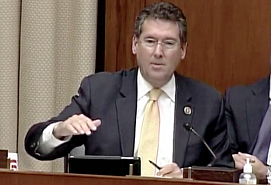 Gregg Harper (R-MS) (pictured left) was next. He noted that gaming is a major industry in his home state, but also that it is tourism-centered. He was concerned that the Barton bill didn’t address international operators. He asked Abboud what it would take for the U.S. to efficiently and effectively regulate online gambling and control international operators. Abboud replied that such control is possible because the feds shut down online international pharmacies. He then reiterated his same points about how dangerous the Internet is and called it “a plague to the youth of America, our ‘Joe Camel’ moment.” Abboud said there hasn’t been enough discussion of how to shut down international sites – as if there were actually a way to build a firewall around the U.S. to prevent connections to such sites.
Gregg Harper (R-MS) (pictured left) was next. He noted that gaming is a major industry in his home state, but also that it is tourism-centered. He was concerned that the Barton bill didn’t address international operators. He asked Abboud what it would take for the U.S. to efficiently and effectively regulate online gambling and control international operators. Abboud replied that such control is possible because the feds shut down online international pharmacies. He then reiterated his same points about how dangerous the Internet is and called it “a plague to the youth of America, our ‘Joe Camel’ moment.” Abboud said there hasn’t been enough discussion of how to shut down international sites – as if there were actually a way to build a firewall around the U.S. to prevent connections to such sites.
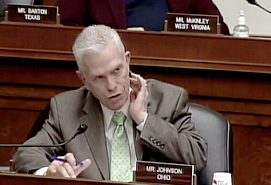 Bill Johnson (R-OH) (pictured right), a self-described “IT geek,” was next. He asked Freeman what the AGA’s current position is since it has changed multiple times, and whether it wants a federal law. Freeman said AGA wants a federal solution but is confident that the states can regulate effectively if the federal level doesn’t get moving quickly enough. Johnson said we don’t ban prescription drugs because some people become addicted to them, but wondered about how protections for minors could be airtight. Pappas said regulation in three states and in Europe showed that the technology exists to protect children and problem gamblers and is highly effective. He also said it is easier to protect problem gamblers online than it is in brick-and-mortar casinos because recordkeeping is automatic.
Bill Johnson (R-OH) (pictured right), a self-described “IT geek,” was next. He asked Freeman what the AGA’s current position is since it has changed multiple times, and whether it wants a federal law. Freeman said AGA wants a federal solution but is confident that the states can regulate effectively if the federal level doesn’t get moving quickly enough. Johnson said we don’t ban prescription drugs because some people become addicted to them, but wondered about how protections for minors could be airtight. Pappas said regulation in three states and in Europe showed that the technology exists to protect children and problem gamblers and is highly effective. He also said it is easier to protect problem gamblers online than it is in brick-and-mortar casinos because recordkeeping is automatic.
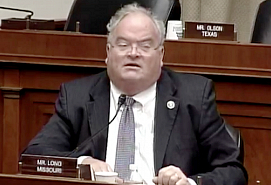 Billy Long (R-MO) (at left) was next. He asked Eggert about how bots operate. Eggert explained that some sites have used bots to create more action, and that individuals have designed and operated bots on their own computers. Long asked Freeman about how people can be assured that there will be no cheating scandals like UltimateBet. Freeman said that regulation and licensing will prevent such scandals because operators would lose their brick-and-mortar licenses if they allowed such behavior. Freeman said that allowing gaming companies to tap the Internet market will keep them relevant in the modern market.
Billy Long (R-MO) (at left) was next. He asked Eggert about how bots operate. Eggert explained that some sites have used bots to create more action, and that individuals have designed and operated bots on their own computers. Long asked Freeman about how people can be assured that there will be no cheating scandals like UltimateBet. Freeman said that regulation and licensing will prevent such scandals because operators would lose their brick-and-mortar licenses if they allowed such behavior. Freeman said that allowing gaming companies to tap the Internet market will keep them relevant in the modern market.
The last time the committee took up the issue of online gaming there was a lot of hyperbole thrown around. This time around, the hyperbole was limited to Sheldon Adelson’s consigliore, a sign that the winds are shifting in favor of the gaming companies. All of the members who addressed him were sure to point out that they respect Las Vegas Sands Corporation, but they were very clearly critical of the points he put forth. This doesn’t mean that online gambling is coming to all of America anytime soon, but it is a nod to the fact that the industry is moving forward with or without the federal government’s involvement. Whether or not there is any movement on Barton’s bill during this Congress, it seems like only a matter of time before the realities of the industry force the federal government into addressing the issue.



